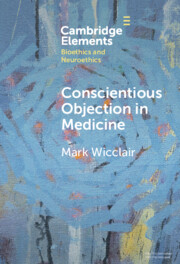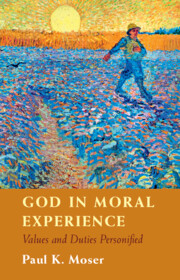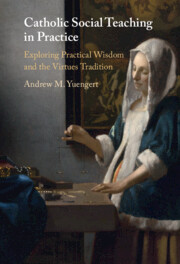100 results
Chapter 3 - Puritan Democracy
-
- Book:
- Democracy, Theatre and Performance
- Published online:
- 17 May 2024
- Print publication:
- 27 June 2024, pp 63-89
-
- Chapter
- Export citation
Should Catholics Support Laws Prohibiting Abortion?
-
- Journal:
- New Blackfriars / Volume 105 / Issue 3 / May 2024
- Published online by Cambridge University Press:
- 18 April 2024, pp. 244-264
- Print publication:
- May 2024
-
- Article
-
- You have access
- Open access
- HTML
- Export citation
Chapter 6 - Multilevel Identity and the Moral Middle Ground
-
- Book:
- Entering the Moral Middle Ground
- Published online:
- 15 March 2024
- Print publication:
- 28 March 2024, pp 223-278
-
- Chapter
- Export citation

Conscientious Objection in Medicine
-
- Published online:
- 12 March 2024
- Print publication:
- 11 April 2024
-
- Element
- Export citation
Conscience des déficits dans le cadre de la maladie d’Alzheimer : représentations et vécu des professionnels soignants
-
- Journal:
- Canadian Journal on Aging / La Revue canadienne du vieillissement , First View
- Published online by Cambridge University Press:
- 07 March 2024, pp. 1-8
-
- Article
- Export citation
ON TRUSTS, HYPOCRISY AND CONSCIENCE
-
- Journal:
- The Cambridge Law Journal / Volume 83 / Issue 1 / March 2024
- Published online by Cambridge University Press:
- 03 April 2024, pp. 158-183
- Print publication:
- March 2024
-
- Article
-
- You have access
- Open access
- HTML
- Export citation

God in Moral Experience
- Values and Duties Personified
-
- Published online:
- 09 November 2023
- Print publication:
- 23 November 2023
Chapter 4 - Libel, Equity, and Law in Sir Thomas More
- from Part II - Libels on the Elizabethan Stage
-
- Book:
- Libels and Theater in Shakespeare's England
- Published online:
- 05 October 2023
- Print publication:
- 19 October 2023, pp 115-143
-
- Chapter
- Export citation
3 - Mankind Is What Anarchy Makes of It
-
- Book:
- Right and Wronged in International Relations
- Published online:
- 29 July 2023
- Print publication:
- 10 August 2023, pp 65-97
-
- Chapter
- Export citation
The Significance of Conscience in Community: Rethinking the ‘Hands Off Religion’ Doctrine
-
- Journal:
- Canadian Journal of Law & Jurisprudence / Volume 36 / Issue 2 / August 2023
- Published online by Cambridge University Press:
- 18 July 2023, pp. 463-490
- Print publication:
- August 2023
-
- Article
-
- You have access
- Open access
- HTML
- Export citation
1 - Strategy and the Organization of Authenticity in the Polis
- from Part I - Authenticity
-
- Book:
- The Poverty of Strategy
- Published online:
- 14 July 2023
- Print publication:
- 29 June 2023, pp 15-49
-
- Chapter
- Export citation
5 - Hutcheson and Butler
-
- Book:
- Modern Moral Philosophy
- Published online:
- 10 June 2023
- Print publication:
- 15 June 2023, pp 165-200
-
- Chapter
- Export citation
PREVENTING THE INFINITE REGRESS: DISCRETION, BARS TO RELIEF AND THE STRUCTURE OF EQUITY
-
- Journal:
- The Cambridge Law Journal / Volume 82 / Issue 2 / July 2023
- Published online by Cambridge University Press:
- 08 June 2023, pp. 350-361
- Print publication:
- July 2023
-
- Article
-
- You have access
- Open access
- HTML
- Export citation

Catholic Social Teaching in Practice
- Exploring Practical Wisdom and the Virtues Tradition
-
- Published online:
- 03 June 2023
- Print publication:
- 15 June 2023
Chapter 9 - The Many Sides of Personification
-
-
- Book:
- Literary Theory and Criticism in the Later Middle Ages
- Published online:
- 20 April 2023
- Print publication:
- 20 April 2023, pp 180-205
-
- Chapter
- Export citation
Chapter 1 - The Lament of the Demobilized
-
-
- Book:
- How to End a War
- Published online:
- 02 March 2023
- Print publication:
- 09 March 2023, pp 10-30
-
- Chapter
- Export citation
Introduction
-
-
- Book:
- How to End a War
- Published online:
- 02 March 2023
- Print publication:
- 09 March 2023, pp 1-9
-
- Chapter
- Export citation
Συνɛίδησις in Paul's Texts and Stoic Self-Perception
-
- Journal:
- New Testament Studies / Volume 69 / Issue 2 / April 2023
- Published online by Cambridge University Press:
- 08 March 2023, pp. 182-194
- Print publication:
- April 2023
-
- Article
-
- You have access
- Open access
- HTML
- Export citation
5 - Necessity, Free Will and Conscience
-
- Book:
- The Necessity of Nature
- Published online:
- 16 February 2023
- Print publication:
- 23 February 2023, pp 136-162
-
- Chapter
- Export citation
1 - A Christian Science
-
- Book:
- The Necessity of Nature
- Published online:
- 16 February 2023
- Print publication:
- 23 February 2023, pp 19-48
-
- Chapter
- Export citation



